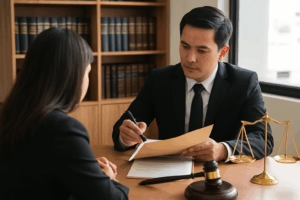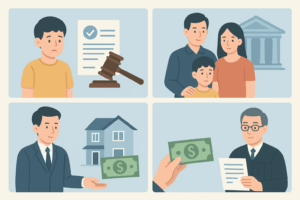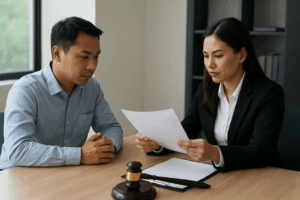In today’s digital age, the internet has become an integral part of our daily lives, revolutionizing the way we communicate, work, and conduct business. However, along with the benefits of technology comes the risk of cybercrime. For foreigners living in Thailand, understanding the country’s laws related to cybercrime is essential for protecting oneself online and avoiding legal trouble. If you find yourself in legal trouble, seeking guidance from a reputable law firm in Bangkok or Thailand can provide invaluable assistance.
Understanding Cybercrime in Thailand:
Cybercrime encompasses a wide range of illegal activities conducted online, including hacking, online fraud, identity theft, and defamation. In Thailand, laws governing cybercrime are aimed at combating these offenses and ensuring a safe and secure online environment for all users. A knowledgeable law firm in Bangkok or Thailand can help navigate the complexities of cybercrime laws and provide expert legal advice.
Hacking:
Hacking involves gaining unauthorized access to computer systems or networks with the intention of stealing data, disrupting services, or causing damage. In Thailand, hacking is considered a serious offense punishable by law. Offenders may face imprisonment and hefty fines, highlighting the importance of securing your digital assets and using strong passwords to protect against unauthorized access. A reputable law firm in Bangkok or Thailand can offer guidance on legal remedies in case of hacking incidents.
Online Fraud:
Online fraud encompasses various deceptive practices aimed at defrauding individuals or businesses over the internet. Common examples include phishing scams, fake websites, and fraudulent online transactions. In Thailand, engaging in online fraud is illegal and can result in criminal charges. Foreigners should exercise caution when sharing personal or financial information online and verify the legitimacy of websites and transactions to avoid falling victim to fraudsters. Seeking assistance from a knowledgeable law firm in Bangkok or Thailand can provide legal support in cases of online fraud.
Identity Theft:
Identity theft occurs when someone steals another person’s personal information, such as their name, social security number, or credit card details, to commit fraud or other crimes. In Thailand, identity theft is a punishable offense under the country’s laws. Foreigners should take steps to safeguard their personal information, such as using secure passwords, monitoring their financial accounts regularly, and being cautious when sharing sensitive information online. If you become a victim of identity theft, consulting with a reputable law firm in Bangkok or Thailand can help protect your rights and pursue legal action against the perpetrators.
Identity Theft:
Identity theft occurs when someone steals another person’s personal information, such as their name, social security number, or credit card details, to commit fraud or other crimes. In Thailand, identity theft is a punishable offense under the country’s laws. Foreigners should take steps to safeguard their personal information, such as using secure passwords, monitoring their financial accounts regularly, and being cautious when sharing sensitive information online. If you become a victim of identity theft, consulting with a reputable law firm in Bangkok or Thailand can help protect your rights and pursue legal action against the perpetrators.
Defamation:
Defamation involves making false statements that harm a person’s reputation, either verbally or in writing. With the rise of social media and online forums, defamation has become a prevalent issue in the digital sphere. In Thailand, defamation laws are strict, and offenders can face criminal charges and civil lawsuits for defamatory statements made online. Foreigners should exercise caution when expressing opinions or sharing information online to avoid inadvertently violating defamation laws. If you find yourself involved in a defamation case, seeking legal representation from a reputable law firm in Bangkok or Thailand is essential to navigate the legal process and protect your interests.
Defamation:
Defamation involves making false statements that harm a person’s reputation, either verbally or in writing. With the rise of social media and online forums, defamation has become a prevalent issue in the digital sphere. In Thailand, defamation laws are strict, and offenders can face criminal charges and civil lawsuits for defamatory statements made online. Foreigners should exercise caution when expressing opinions or sharing information online to avoid inadvertently violating defamation laws. If you find yourself involved in a defamation case, seeking legal representation from a reputable law firm in Bangkok or Thailand is essential to navigate the legal process and protect your interests.
Protecting Yourself Online:
To protect yourself from cybercrime in Thailand, it’s essential to stay informed about the country’s laws and regulations governing online activities. Additionally, follow these tips to enhance your online security:
Use strong, unique passwords for your accounts and enable two-factor authentication whenever possible.
Avoid clicking on suspicious links or downloading files from unknown sources.
Keep your software and antivirus programs up to date to protect against malware and viruses.
Be cautious when sharing personal or financial information online, especially on public Wi-Fi networks.
Regularly monitor your financial accounts for any unauthorized transactions or suspicious activity.
Conclusion:
As the internet continues to evolve, so do the threats posed by cybercrime. For foreigners living in Thailand, understanding the country’s laws related to cybercrime and taking necessary precautions to protect oneself online is crucial. By staying informed and adopting best practices for online security, you can reduce the risk of falling victim to cybercriminals and enjoy a safer, more secure digital experience. In case of any legal concerns related to cybercrime, consulting with a reputable law firm in Bangkok or Thailand can provide expert guidance and support.
Contact : Siam Center Law Group by calling +66(0) 2 648 5041, +66(0) 2 648 5042





